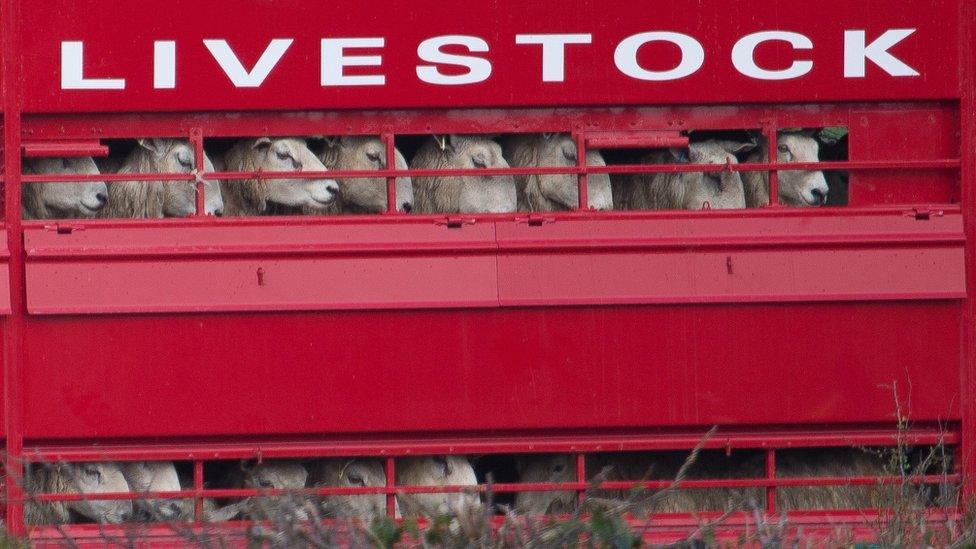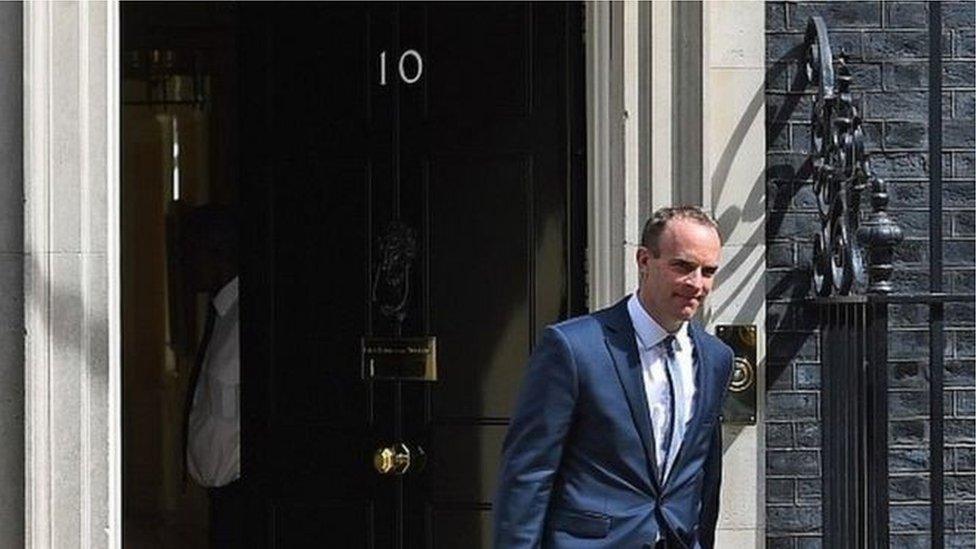Brexit, Ready or not?
- Published
The National Audit Office has looked at one corner of Whitehall, to test its readiness for a "no-deal" Brexit. It's highly unimpressed
Certification and many more vets would be needed for food exports. The chemicals industry cannot begin to register for exports until after Brexit
On several counts, the environment, agriculture and food department has been blocked from making preparations

There would be a need to reach agreement on 1,400 licences for UK live animal and meat exports with 154 countries
What is the state's state of readiness for talks on Brexit crumbling to dust, in case a "no-deal" departure awaits us less than 200 days away?
It's worth a squint at the National Audit Office (NAO) report into just a handful of the areas where it is trying to prepare.
These are in the Department for the Environment, Food and Agriculture, or Defra. Much of its writ doesn't run in Scotland. But some of it does and much of it would have a direct impact, given that so much Scottish trade with the European Union has to pass through England and English ports.
The Whitehall spending watchdog has praise for a lot of work done and of preparations made, in the face of an enormous workload. Defra secured £320m of Treasury cash to help with the process, and by last March, it had recruited 1,300 extra staff.
That's a start, and it is strongly emphasised in Defra's response to this NAO report. Michael Gove's department also claims that things have changed for the better since the auditors were preparing their findings.
'Not understood'
So what has the department not done? Well, for a start, it doesn't seem to have understood the scale of the task.
"The risk of Defra not delivering everything it had originally intended for a 'no deal' scenario is high and, until recently, not well understood by the department", says the National Audit Office (NAO).
It took, as a sample, only four Brexit workstreams out of 55 in Defra (which accounts for around a sixth of the Whitehall Brexit workstream total). Only six of Defra's workstreams have achieved the level of planning expected by next March.
On export of live animals and of meat, there would be a need to reach agreement on 1,400 licences for UK exports with 154 countries. So far, the emphasis is on getting an agreement with 15 nations which account for 90% of trade.

Defra does not have enough marine patrol vessels
Supposing they are successfully achieved - which is a big supposition - the other 10% of exports to the other 144 countries amounts to £760m worth of sales. And being live or food, they can't all sit on the quayside awaiting further negotiations.
This, we are told is a risk that Defra has not "accepted".
For these exports, health certificates would be required, unless there's a deal to avoid the need for them.
That would need a lot of vets. But the NAO tells us: "Defra intended to start engaging with the veterinary industry in April 2018, but has not been permitted to do so, and now plans to launch an emergency recruitment campaign in October to at least meet minimum levels of vets required".
Stop a moment and consider the words "has not been permitted". Others, somewhere in Whitehall - or Downing Street - have stopped them from preparing as they should? If, by next April 1, there's no deal when planning for that has been blocked, then someone's going to look foolish.
You may recall that, of the vets currently employed in Britain's abattoirs, well over 90% are non-UK nationals. There aren't that many around. And vets take five years to train, very expensively.
Chemistry lesson
Defra has the role, in English waters, of patrolling them - of "taking back control" to ensure that EU boats are kept out or only allowed in on restricted licences.
To do that, it knows that it has to step up patrols. But it doesn't have enough patrol vessels, and according to the NAO, it hasn't made much progress in procuring them.
The Scottish government has a similar responsibility with fishery protection vessels in Scottish waters. It may face a similar challenge if there are sea battles over access to traditional fishery grounds.

Dominic Raab is unleashing the next round of "no deal" papers
Chemical exports are worth £17bn a year. They are also covered by Defra oversight, probably because the industry's regulation has a lot of environmental factors to it.
Without a Brexit deal, that will require new recognition of chemicals being exported from the UK. That would require registration with an affiliate or representative within an EU country. That takes a while, and negotiations on it cannot begin until Britain has exited the EU.
"Defra has not been able to fully support businesses in their preparations," the NAO continues. "As a result of government restrictions, communicated through the Department for Exiting the EU, it has not been able to hold open consultations with stakeholders on their preparations for a no-deal scenario.
"It has also, until very recently, been prevented from issuing specific information for the chemical industry or food importers and exporters".
So there you have two more counts on which Defra has been blocked from elsewhere in Whitehall from making necessary preparations.
'Accurate picture'
And there's a a further sting for Downing Street from the NAO chief Amyas Morse who said: "Like other departments, it now must ensure its voice is heard by the centre of government to provide an accurate picture of what is possible if a negotiated settlement is not reached, and even if it is."
In other words, the NAO has concluded that Downing Street doesn't actually know how complex this Brexit process looks from across Whitehall's departments. And that's even if everything goes to the government's plan.
Stand by for much more of this on Thursday.
Dominic Raab is about to unleash the next round of "no deal" papers - telling most of the country that they should be reassured that it can be planned for, while, paradoxically, spelling out to Brexiteers why it would be unwise to to keep pushing talks to the cliff edge.